

Oppositional Defiant Disorder: ODD Symptoms, Causes, Solutions & Overlap with ADHD. What Is ODD?
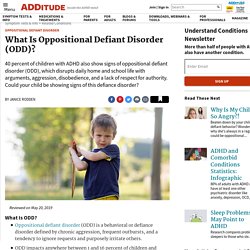
ODD Definition An oppositional, defiant child will often lose his temper, argue with adults, actively defy requests or rules set by adults, deliberately annoy people, and blame others for misbehavior. He will engage in angry, violent, and disruptive conduct directed at the adults in his life — parents, teacher, physicians, and other authority figures. And he may seem to feel most comfortable in the midst of a conflict, which is upsetting and exhausting for everyone involved — even the child himself.
The symptoms of ODD may look different for girls and boys, in whom the condition is more common. [Free Download: How to Neutralize Your Child’s Anger] Read on to learn more about ODD and how to turn around problem behavior with treatment, which typically includes therapy — both individual and family — and sometimes medication. Symptoms of ODD All children defy their parents and lash out from time to time. Types of ODD Physicians typically see two types of ODD. Dysgraphia Treatment: An App for Kids with Poor Penmanship. Steven is a fifth-grader who I met during my occupational therapy fieldwork several months ago.
He was diagnosed with dysgraphia. His handwriting is so messy that no one can read it. His occupational therapist tried many things to help him improve his penmanship, but nothing worked. The determined OT even scanned his worksheets into a computer so he could type in answers to questions, but it was too time consuming and she stopped doing it. Steven was frustrated about getting left behind in class because he couldn’t complete the worksheets with the rest of his peers. ADHD Brain: Unraveling Secrets of Your ADD Nervous System. Attention deficit disorder (ADHD or ADD) is a confusing, contradictory, inconsistent, and frustrating condition.
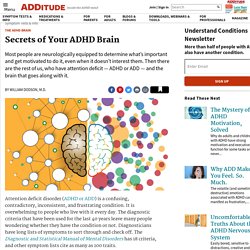
It is overwhelming to people who live with it every day. The diagnostic criteria that have been used for the last 40 years leave many people wondering whether they have the condition or not. Diagnosticians have long lists of symptoms to sort through and check off. The Diagnostic and Statistical Manual of Mental Disorders has 18 criteria, and other symptom lists cite as many as 100 traits. Practitioners, including myself, have been trying to establish a simpler, clearer way to understand the impairments of ADHD. My work for the last decade suggests that we have been missing something important about the fundamental nature of the ADHD brain. I found it. - The Washington Post. 10 Great Stocking Suffers for Kids with ADHD. The untold value of consistently effective teachers. How effective can teachers be in affecting the achievement of the students they teach?

This is a vital question as we confront educational inequality, and is especially vital for those children who, on the basis of the stats, are predicted to achieve lower in school. Specifically, in Aotearoa, this often describes kids from low-income backgrounds, those who are Māori or Pasifika, and kids with special education needs. It is perhaps obvious, but definitely worth stating, that this inequality is a description of an average correlation between ‘groups’, and doesn’t describe all people from those groups. There are many people who, in the face of the predictions, are very successful – not in spite of, but because of, who they are. And, of course, it depends on how you define ‘success’ anyway, since one person’s aspiration may not be another’s. On this basis, it is safe to say that inequality in education has not been caused by teachers, or by schools. ADHD Motivation Techniques for Your Child's Brain. Why Is It So Hard to Motivate Kids with ADHD?
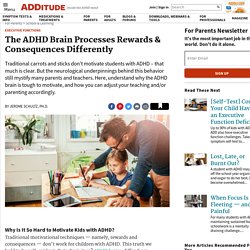
Traditional motivational techniques — namely, rewards and consequences — don’t work for children with ADHD. This truth we hold to be self-evident. But why is it so? ADHD brains differ from neurotypical ones in a few important ways that impact motivation: The parts of the brain that manage executive functions and emotions have different levels of activity.Electrical activity differences make it harder for ADHD brains to filter out irrelevant stimuli, and focus on the task at hand.ADHD is linked to low dopamine activity, which impacts desire — and reactions to rewards, success, and failure.
Writing Strategies for Students With ADHD. As essay writing is both the most common and the most complicated assignment for students, writing instruction for students with ADHD requires special efforts.
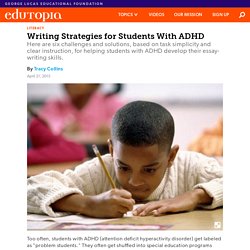
Each step of writing process may present certain difficulties for these young people. Here are some practical solutions for teachers to encourage, motivate, and focus their students on writing process. 1. Difficulty Concentrating on Assignment Research proves that ADHD doesn’t result in less intelligence, but rather in difficulties controlling emotions, staying motivated, and organizing the thoughts. Solution: Give clear, concise instructions. When assigning an essay or other writing project, be specific and clear about what you expect. Think about the last time you felt happy and joyful. Make sure every student knows that he or she should come to you directly with any questions. 2. ADHD Behavior Therapy: A Pragmatic Parent's Guide to Treatment. How Does Behavior Therapy Help Children with ADHD?
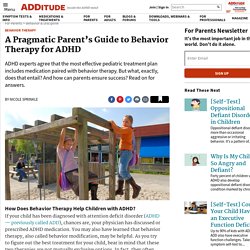
If your child has been diagnosed with attention deficit disorder (ADHD — previously called ADD), chances are, your physician has discussed or prescribed ADHD medication. You may also have learned that behavior therapy, also called behavior modification, may be helpful. As you try to figure out the best treatment for your child, bear in mind that these two therapies are not mutually exclusive options. In fact, they often work best together in solving ADHD behavior problems. This is clearly shown by the landmark National Institute of Mental Health‘s (NIMH) Multimodal Treatment Study of Children with ADHD. 10 Things People Say to You When You’re Raising an Extreme Child.
ADDitude – Inside the ADHD mind. ADHD and Anxiety: Keep Your Child Calm and Carry On. ADHD and Autism: Differing Symptoms of ADD & ASD. ADHD in Children: Help for Parents of Kids with ADD. ADHD in Girls and Women Looks Different: Here's How. ADHD and High IQ: The Truth About Twice Exceptional Intelligence. ADHD and Learning Disabilities Directory: ADD Coaches, Organizers, Doctors, Schools, Camps. ADHD Motivation Problems: Why Is It So Hard to Get Started? Despite the many differences among children and adults with attention deficit disorder (ADHD or ADD), there is one similarity shared by virtually all of them.
Although they have considerable chronic difficulty in getting organized and getting started on many tasks, focusing their attention, sustaining their efforts, and utilizing their short-term working memory, all of those diagnosed with ADHD tend to have at least a few specific activities or tasks for which they have no difficulty in exercising these very same functions in a normal or an extraordinary way. The inconsistency in motivation and performance is the most puzzling aspect of ADHD. It seems like the child or adult with the disorder who can show strong motivation and focus very well for some tasks should be able to do the same for most other tasks that they recognize as important. It appears as if this is a simple problem of lacking “willpower.” [Self-Test: Signs of Emotional Hyperarousal] Your Emotional Brain Motivation Factors.
ADHD Prevalence Increases in American Children. September 6, 2018 A recent study1, published online in JAMA Network Open, found that the proportion of children in the United States diagnosed with attention deficit disorder (ADHD or ADD) rose dramatically from 6.1% in 1997 to 10.2% in 2016.
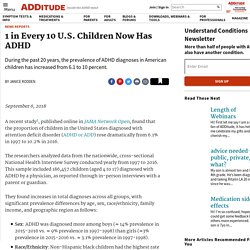
The researchers analyzed data from the nationwide, cross-sectional National Health Interview Survey conducted yearly from 1997 to 2016. This sample included 186,457 children (aged 4 to 17) diagnosed with ADHD by a physician, as reported through in-person interviews with a parent or guardian. ADHD & Related Conditions: Anxiety, Depression, OCD, ODD, Autism. ADHD and Sleep: Why You're Always Tired. ADHD Writing Difficulties: 18 Tricks to Write More Effectively. Attention Deficit and Hyperfocus: Brain Freeze - Why ADHDers Need Downtime. Asperger's and ADHD/ADD: Understanding the Autism Spectrum. Classroom Strategies for Teachers of Students with ADHD or LD. Current diagnosis and treatment practices for attention-deficit hyperactivity disorder with children : a thesis presented in partial fulfilment of the requirements for the degree of Master of Arts in Psychology at Massey University.
Current Research on ADHD: Breakdown of the ADHD Brain. Dealing with ADHD: 80 Coping Strategies. Decoding the Link Between ADHD and Behavior. Executive Function in ADHD: Routines to Help Improve Memory. Explaining ADHD to Teachers: Back-to-School Resource. Getting Focused with Adult ADHD. Gifted and Talented: A Girl's Story of Undiagnosed ADHD. How to Teach Your Teen with ADHD to Manage Screen Time. IEP Plans & ADHD Test Taking. Jake has a high IQ, but he has a problem showing what he knows on tests.
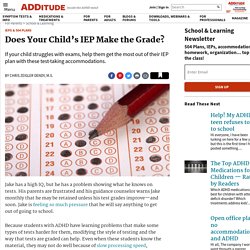
His parents are frustrated and his guidance counselor warns Jake monthly that he may be retained unless his test grades improve—and soon. Jake is feeling so much pressure that he will say anything to get out of going to school. Because students with ADHD have learning problems that make some types of tests harder for them, modifying the style of testing and the way that tests are graded can help. Even when these students know the material, they may not do well because of slow processing speed, problems expressing themselves in writing, and poor memory.
From D’s to B’s Test modifications have been a lifesaver for many students with ADHD. [Your Free Guide to the 40 Best Accommodations for Children with ADHD or LD] If you have a son or daughter like Jake, talk with the special-ed team about adding some of these accommodations to his IEP: Find alternative times for completing a test. Select a good test location. Inattentive ADHD Explained: Free Download from ADDitude. Mom's Advice for Teachers of ADHD Students. Morning Routine for ADHD Kids: Six Steps to a Stress-Free Start. Not Focused at School? Helping a Child with ADHD / ADD Focus & Learn. The problem: “My child doesn’t focus and listen.”
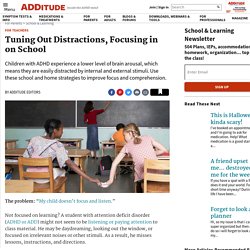
Not focused on learning? A student with attention deficit disorder (ADHD or ADD) might not seem to be listening or paying attention to class material. He may be daydreaming, looking out the window, or focused on irrelevant noises or other stimuli. Quiet Fidgets to Help Kids Focus: Our Readers' Top 5 Favorites... Rejection Sensitive Dysphoria: How to Treat it Alongside ADHD. Rejection sensitive dysphoria (RSD) is an extreme emotional sensitivity and emotional pain triggered by the perception — not necessarily the reality — that a person has been rejected, teased, or criticized by important people in their life.
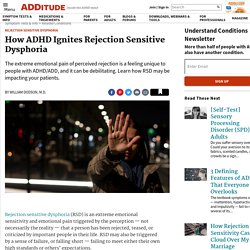
RSD may also be triggered by a sense of failure, or falling short — failing to meet either their own high standards or others’ expectations. Dysphoria is Greek for “difficult to bear.” It’s not that people with attention deficit disorder (ADHD or ADD) are wimps, or weak; it’s that the emotional response hurts them much more than it does people without the condition. Strategies to Help ADHD Students, for Teachers.
1 of 10 Learning Is a Collaboration Success in the classroom is a two-way street. To learn, students must show up prepared and excited for class. But teachers have to prepare as well. Understanding a student’s unique challenges will help teacher and student become a winning team. Stress Relief in Learning with ADHD: Tips for Parents and Teachers. Teaching Kids With ADHD: School and Learning. Teaching is rewarding and challenging, but teaching students with ADHD calls for special effort to do the job well. When I homeschooled my children, all of whom have ADHD, they kept trying to show me how they needed to learn.
I finally got it. I learned how to tweak the curriculum and my teaching strategies to meet the needs of my distractible students. If you’re a parent raising a child with ADHD, perhaps one or two of the lessons will help you and your student at home. Talk with the teacher about using a couple of these suggestions, as well. The Civil War Inside My ADHD Brain. The Silent Suffering of Adults with ADHD. Women With Sensory Processing Disorder: Understand Conditions. ADHD Expert Webinars from ADDitude Magazine. Products – ADDitude. Downloads – ADDitude.